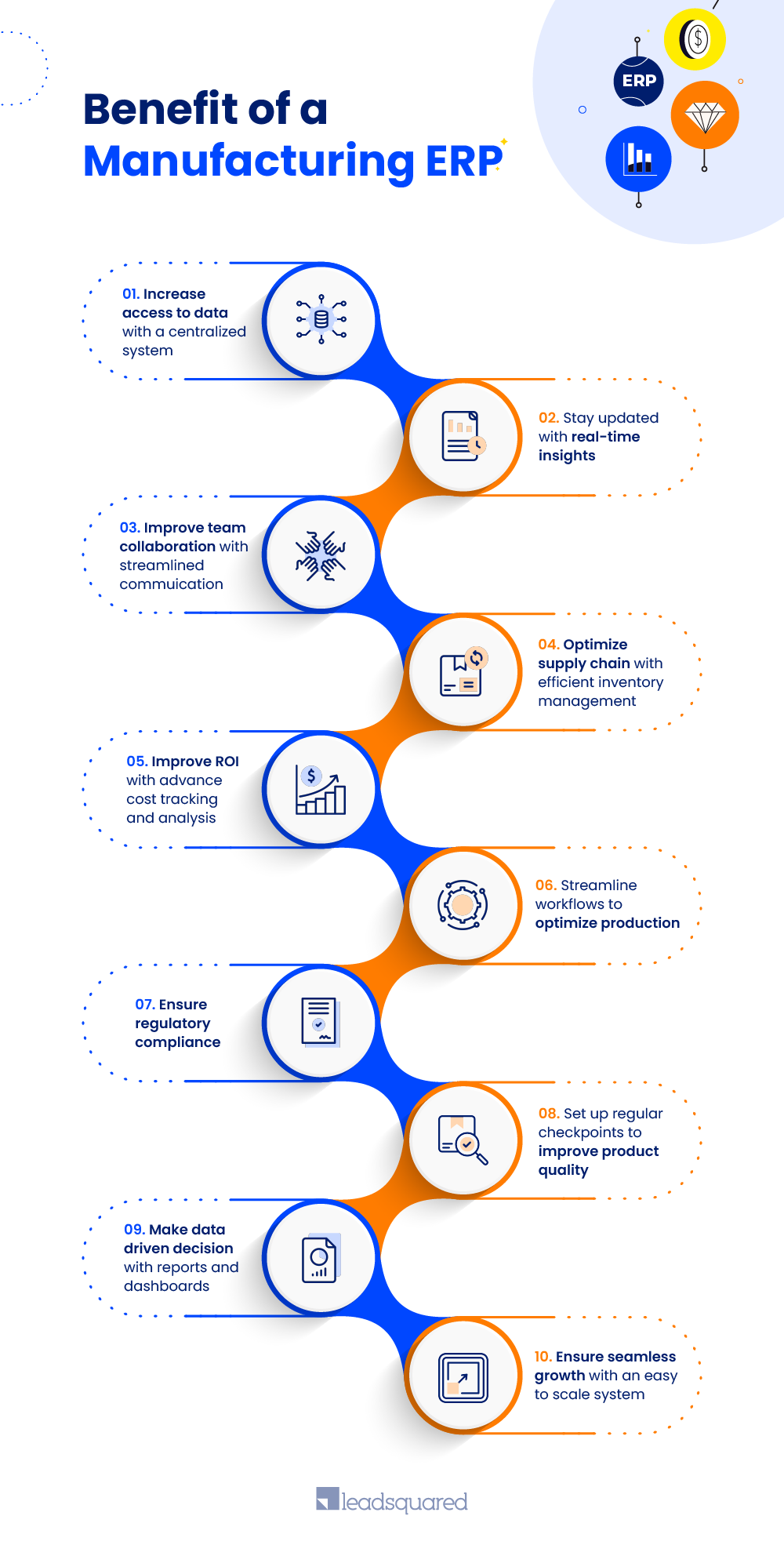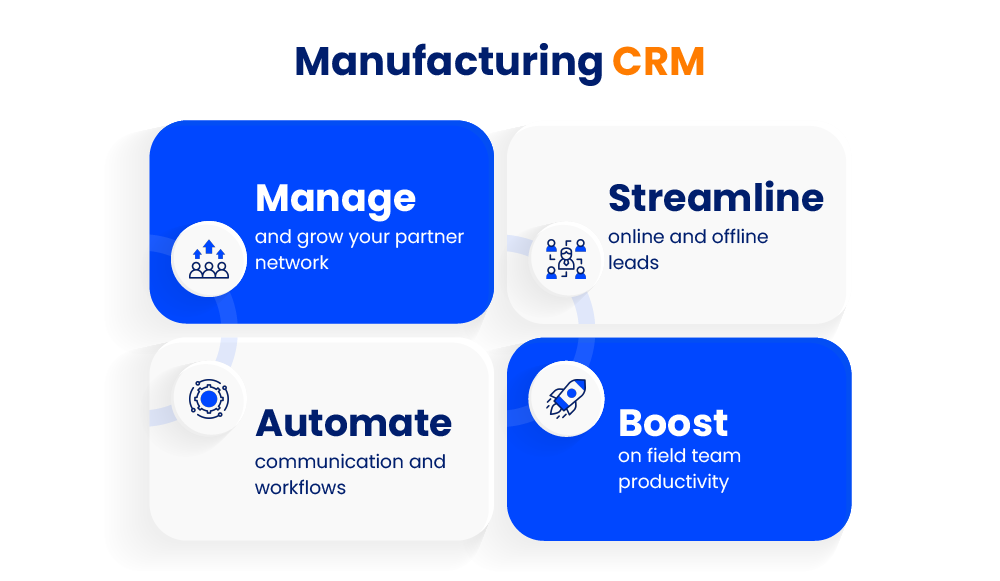- Home
- Learn
- Manufacturing
- What Is a Manufacturing ERP? The Complete Guide
MANUFACTURING
What Is a Manufacturing ERP? The Complete Guide
Contents
Don’t you just love it when your business is booming? Orders are pouring in, papers are piling up, and the factory is buzzing around the clock to keep up with all the demand.
However, it’s important to be extra conscious during this period, as it can quickly become overwhelming if not managed properly. You might start to face challenges in handling your supply chain and other operations efficiently.
Your teams could find themselves stuck with mundane tasks. And there’s always a risk of missing out on promising opportunities.
But guess what? There’s a solution: a manufacturing ERP. It’s like a super-oiled machine for manufacturing businesses, here to help you say goodbye to chaos.
In this article, we will answer all your questions about ERPs. By the time you’re done reading, you’ll know everything you need to make your business even better.
Let’s start with understanding what an ERP is.
A manufacturing ERP (Enterprise Resource Planning), is used to streamline manufacturing business operations. It is either an ERP system or ERP software. Now, when we say business operations it includes:
And what will happen when we implement a manufacturing ERP in these processes? Let us have a look:
These are just a few examples, there is a lot more that a manufacturing ERP can do. Let’s discuss the features and benefits of a manufacturing ERP in detail.

Let’s dive into the nitty-gritty of what makes a manufacturing ERP shine. These features and their respective benefits, are what turns it from just a piece of software into your business’s best friend:
A manufacturing ERP gathers all your crucial information – from inventory levels to production schedules – and stores it in one easily accessible place.
How does it help?
Manufacturing ERP software shows you exactly what’s happening on the factory floor at any given moment. You can check the batch details or quality anytime during production. It provides real-time updates on inventory, delivery and more.
How does it help?
ERP software acts as a digital megaphone, broadcasting information across departments so everyone is on the same page.
How does it help?
With a manufacturing ERP system, you can track inventory levels accurately and set reorder points.
How does it help?
ERP systems help streamline workflows. It offers tools to plan, manage, and optimize production workflows.
How does it help?
You can set up quality checkpoints using a manufacturing ERP system. For example, you can set up daily inspections to test the quality of wood or raw materials in a plywood factory.
How does it help?
An ERP system helps you track all expenses from raw materials to production and till delivery. It provides insights into resource usage.
How does it help?
A manufacturing ERP system assists in ensuring that your factory follows the required compliance. It can be done in multiple ways. For example, in food manufacturing, it adds hourly tasks to update the quality of each batch being produced. This helps in ensuing FSSAI compliances.
How does it help?
An ERP generates detailed reports on various aspects of your operations, spends, resource usage, etc.
How it helps?
As your business grows, your ERP should grow with you. Whether you’re adding new products, expanding to new markets, or ramping up production, a good ERP adapts to your changing needs.
How it helps?
So, there you have all the benefits you can achieve by implementing manufacturing ERP software.
But when is a company ready for an ERP? Because a group of 50 people may not require it, and when you have crossed the mark of 1000, it may already be too late!
Let’s discuss this…
It’s like recognizing the right moment to upgrade your trusty old machine – you listen for the sounds of struggle and keep an eye out for signs of inefficiency. Here are the signs that your factory is ready to embrace a manufacturing ERP system:
The best example of this is using the same Excel sheet to track 10,000 orders that you used for 500 orders earlier. This Excel sheet will now increase the chances of errors in production or billing leading to an inefficient process.
Whereas a manufacturing ERP provides end-to-end order management. It ensures that the process efficiency should only improve to support and boost your growth. It can also help in reducing the complexity of managing larger teams or increasing supply and demand.
Data is important in any industry and manufacturing is no exception. Your intellectual property, customer information, and proprietary processes need to be kept secure.
If your current systems have loopholes, it’s time to consider an ERP that comes with robust security features. Protecting your data isn’t just about safeguarding your business; it’s about preserving your legacy.
But just like there’s no one-size-fits-all approach to manufacturing t-shirts, the same goes for ERPs. Let’s discuss how to pick your perfect fit.
The perfect ERP for you will depend on various factors unique to your business. The following points will help you select the right ERP for your business:
By considering these factors, you’re not just selecting software – you’re setting the foundation for an efficient, thriving factory. So, as you embark on this ERP expedition, keep your factory’s unique needs in mind.
To save some of your time, we have picked the top 5 manufacturing ERP software in the industry.
Here is the list of the most popular ERP software in the manufacturing industry.
While all these ERPs will help you streamline day-to-day operations to enhance efficiency and create the best product, it does not guarantee success. To be successful in the industry it is equally important to understand your customers and their reactions.
And to record every customer interaction you need a CRM.
A manufacturing CRM helps you track every customer interaction from the moment they visit your website or any digital store. Moreover, it helps you to:

To know more about a manufacturing CRM and how you can integrate it with your ERP, book a personalized demo today.
As promised, we’ve covered everything – from the features of manufacturing ERPs to recognizing the signs that you’re ready for this transformative leap. Now, armed with insights, you are ready to shape a future of efficiency and growth.
Some examples of manufacturing ERPs are: SAP, Acumatica, Infor CloudSuite and Microsoft Dynamics 365 Finance & Operations.
The 6 different phases of ERP implementation process are: Discovery and Planning, Design, Development and customization, Testing, Deployment, and team training.
The different types of manufacturing software are: ERP (enterprise resource planning), SCM (supply chain management), CRM (customer relationship management), DMS (Dealership management system), IMS (Inventory management system), QMS (Quality Management Systems), MRP (Material Requirements Planning).